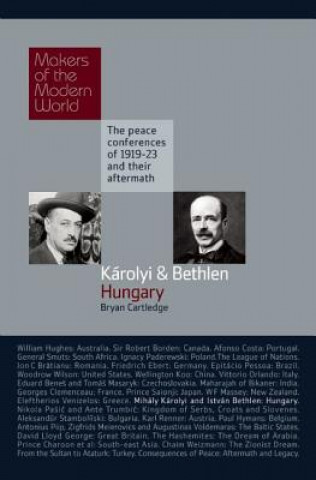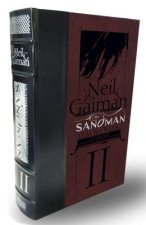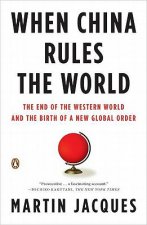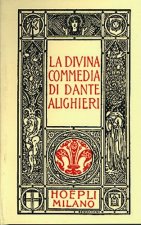
Kód: 04321792
Karoli and Bethlen
Autor Bryan Cartledge
White aster flowers, on sale on the streets of Budapest on the eve of All Souls' Day, are made the symbol of a revolution which brings Mihaly Karolyi (1875-1955) to power at the head of a National Council. Karoly concludes an armi ... celý popis
- Jazyk:
 Angličtina
Angličtina - Vazba: Pevná
- Počet stran: 192
Nakladatelství: Haus Publishing, 2009
- Více informací o knize

403 Kč
Dostupnost:
50 % šance Máme informaci, že by titul mohl být dostupný. Na základě vaší objednávky se ho pokusíme do 6 týdnů zajistit.
Máme informaci, že by titul mohl být dostupný. Na základě vaší objednávky se ho pokusíme do 6 týdnů zajistit.Prohledáme celý svět
Mohlo by se vám také líbit
-

Will to Survive
1242 Kč -

The Will to Survive
640 Kč -

Hunchback of Notre Dame
322 Kč -

High Frequency Words Flashcards
313 Kč -

Desert Prince
566 Kč -

HBR Emotional Intelligence Boxed Set (6 Books) (HBR Emotional Intelligence Series)
1990 Kč -

It Doesn't Have to Be Crazy at Work
433 Kč -

Classmates Vol. 3: Sotsu gyo sei (Spring)
278 Kč -

Chinese Fairy Tales and Legends
356 Kč -

3D Granny Squares
436 Kč -

Fingerprint Activities Dinosaurs
276 Kč -

How to Draw Portraits in Charcoal
735 Kč -

Failed Princesses Vol. 1
275 Kč -

Complete Grimoire
503 Kč -

Gruffalo Touch and Feel Book
203 Kč -

Real-Life BPMN (4th edition): Includes an introduction to DMN
945 Kč -

The Good Karma Tarot
614 Kč -

The King's Beast, Vol. 1
223 Kč -

SHAMAN KING Omnibus 1 (Vol. 1-3)
424 Kč -

Greenlights
487 Kč -

Critical Role: The Chronicles Of Exandria The Mighty Nein (deluxe Edition)
3018 Kč -

Cast On, Bind Off
418 Kč -

Green Eggs and Ham
257 Kč -

Branding In Five and a Half Steps
1009 Kč -

Sandman Omnibus Vol. 2
3310 Kč -

The Goldfinch
378 Kč -

Crazy Good
576 Kč -

Shake Hands With The Devil
378 Kč -

Pity the Nation
543 Kč -

I Am a Strange Loop
549 Kč -

ESV Study Bible, Personal Size
810 Kč -

Red Queen: The Official Coloring Book
367 Kč -

Greatest Success in the World
221 Kč -

Wilderness First Responder
730 Kč -

Disney Princess: A Magical Pop-Up World
1499 Kč -

Charlie Cook's Favourite Book
237 Kč -

When China Rules the World
553 Kč -

Sweet Ruin
266 Kč -

The Obesity Code
419 Kč -

Nasze idealne małżeństwo
223 Kč -

Sturmzeit
310 Kč -

Dante minuscolo hoepliano. La Divina Commedia
509 Kč
Dárkový poukaz: Radost zaručena
- Darujte poukaz v libovolné hodnotě a my se postaráme o zbytek.
- Poukaz se vztahuje na celou naši nabídku.
- Elektronický poukaz vytisknete z e-mailu a můžete ihned darovat.
- Platnost poukazu je 12 měsíců od data vystavení.
Informovat o naskladnění knihy
Zadejte do formuláře e-mailovou adresu a jakmile knihu naskladníme, zašleme vám o tom zprávu. Pohlídáme vše za vás.
Více informací o knize Karoli and Bethlen
Nákupem získáte 40 bodů
 Anotace knihy
Anotace knihy
White aster flowers, on sale on the streets of Budapest on the eve of All Souls' Day, are made the symbol of a revolution which brings Mihaly Karolyi (1875-1955) to power at the head of a National Council. Karoly concludes an armistice which leaves large areas of Hungarian territory under occupation by French, Romanian and Serbian forces. Following the King-Emperor's abdication in November 1918, Hungary is declared an independent republic with Karolyi as its President. He sets about meeting Hungary's most pressing social need, for land reform. But Karolyi's liberal regime is soon beset by strong opposition from the right and from the left. The Allies seal Karolyi's fate by refusing to end the economic blockade of Hungary and by imposing, even in advance of a peace settlement (Hungary is denied an invitation until the Conference is virtually over), even harsher armistice terms. Karolyi flinches from opposing these measures by force. The small socialist element in his government of well-meaning aristocrats defects and forms an alliance with Hungary's fledgling Communist Party. Karolyi resigns and chooses exile. The Communists, led by Bela Kun, take power. Kun raises a Red Army, which defeats a Czech invasion but fails to stem the Romanian advance, which enters Budapest in defiance of orders from Paris and engages in an orgy of pillage and destruction. The Peace Conference despatches a British diplomat, Sir George Clerk, to Budapest to broker a Romanian withdrawal. Clerk succeeds in forming a coalition government of right-wing parties, with token representation for the centre-left, which he recognises in the name of the Peace Conference and invites to send a delegation to Paris. It includes Counts Istvan Bethlen (1874-1946) and Pal Teleki, both future prime ministers. The delegation is presented on arrival, on 6 January 1920, with the draft peace treaty for Hungary which the expert committees of the Conference have produced and which the Council has approved without amendment. The Hungarians are appalled to find that the treaty will deprive their country of two-thirds of her territory and over half of her population. The injustice of the Treaty will drive Hungary into the arms of Nazi Germany, a fatal alliance which will doom Hungary's Jews to annihilation and Hungary to defeat and destruction in the Second World War.
 Parametry knihy
Parametry knihy
Zařazení knihy Knihy v angličtině Humanities History Regional & national history
403 Kč
- Plný název: Karoli and Bethlen
- Autor: Bryan Cartledge
- Jazyk:
 Angličtina
Angličtina - Vazba: Pevná
- Počet stran: 192
- EAN: 9781905791736
- ISBN: 1905791739
- ID: 04321792
- Nakladatelství: Haus Publishing
- Hmotnost: 382 g
- Rozměry: 206 × 139 × 19 mm
- Datum vydání: 14. March 2009
Oblíbené z jiného soudku
-

Hundred Years' War on Palestine
356 Kč -

Ethnic Cleansing of Palestine
378 Kč -

History of Japan
403 Kč -

Ten Myths About Israel
341 Kč -

Strange Death of Europe
433 Kč -

Decline and Fall of the Roman Empire
139 Kč -

Secret History
302 Kč -

God's Playground A History of Poland
1700 Kč -

Mayflower
401 Kč -

How to be a Victorian
302 Kč -

Plantagenets
356 Kč -

General's Son
424 Kč -

Iran: A Very Short Introduction
283 Kč -

Temples of Karnak
3798 Kč -

Cuneiform
276 Kč -

Twenty Years A-Growing
249 Kč -

China in Africa
906 Kč -

Bohemian Paris
415 Kč -

Islandman
282 Kč -

History of Witchcraft in England from 1558 to 1718
460 Kč -

Lancaster And York
493 Kč -

Alexiad
440 Kč -

Inside Hitler's Greece
517 Kč -

Modern France: A Very Short Introduction
336 Kč -

Diana: Her True Story - In Her Own Words
323 Kč -

The Fourth Turning
476 Kč -

The Oxford History of Ancient Egypt
383 Kč -

Churchill: The Power of Words
433 Kč -

Palestine
564 Kč -

Korean History in Maps
706 Kč -

Great Gatsby (Wisehouse Classics Edition)
406 Kč -

Viking Way
1267 Kč -

The Thirteenth Tribe
309 Kč -

My Promised Land
378 Kč -

Vanished Kingdoms
542 Kč -

Age Of Revolution
410 Kč -

Life and Death of Anne Boleyn
584 Kč -

Coming of the Third Reich
463 Kč -

Children of Ash and Elm
487 Kč -

Europe Between the Oceans
799 Kč -

Socialism Betrayed
478 Kč -

303 Squadron
463 Kč -

Ancient Celts, Second Edition
655 Kč -

Dancing in the Glory of Monsters
400 Kč -

Battle of Britain: Luftwaffe Blitz (Images of War)
655 Kč -

Age of Confucian Rule
851 Kč -

Beyond Band of Brothers
410 Kč -

Benjamin Franklin
410 Kč -

On China
487 Kč
Osobní odběr Praha, Brno a 12903 dalších
Copyright ©2008-24 nejlevnejsi-knihy.cz Všechna práva vyhrazenaSoukromíCookies


 Vrácení do měsíce
Vrácení do měsíce 571 999 099 (8-15.30h)
571 999 099 (8-15.30h)